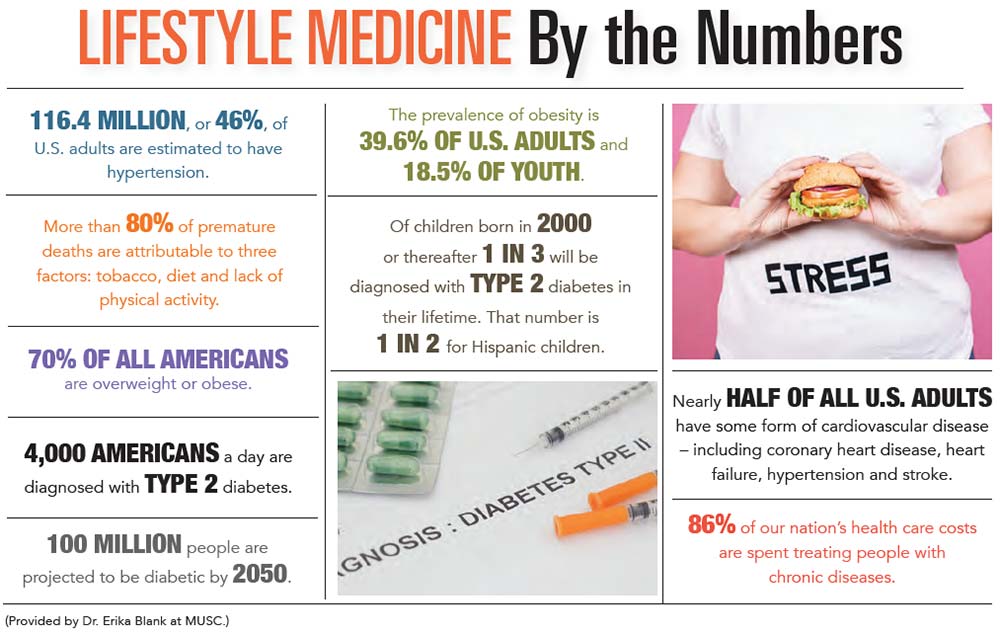Let’s face it – life is hard. It’s a never-ending cycle of working, taking care of family and trying to make our communities a better place. But what about taking care of ourselves? People often overlook the basics and wind up battling illness and disease that could have been avoided. Once considered alternative, lifestyle medicine is now mainstream as patients and doctors shift their views about health care. It’s not replacing modern, western medicine but enhancing it. Using evidence-based behavior, lifestyle medicine is helping prevent, treat and reverse lifestyle-related chronic diseases.
Dr. Erika Blank of MUSC Health Primary Care in Mount Pleasant’s Park West area specializes in primary care and internal medicine but is also board-certified in lifestyle medicine. She said chronic diseases can’t be managed alone with technology or medicine but require lifestyle changes to help treat them.
“Some diseases are absolutely preventable and even reversible,” Dr. Blank said. “Type 2 diabetes is a good example of that.”
She said the main behaviors she encourages are a healthy diet, physical activity, adequate sleep, managing stress, avoiding substance abuse and forming and maintaining a good support system.
While there’s an increase in the number of doctors promoting lifestyle medicine, there is still an epidemic in the United States of obesity and related health troubles.
“Of the children born in or after the year 2000, 1 in 3 will be diagnosed with Type 2 diabetes in their lifetime,” Dr. Blank explained. “That’s an alarming statistic.”
With more people now embracing lifestyle medicine, it is not only better for their health but better financially because most of the health care budget is spent on the treatment of chronic disease.
“I would like to see a shift in that spending, with more emphasis on prevention of these diseases. This is sure to save money in the long run,” Dr. Blank added. “And the only side effects are that you may lose weight and feel great. There’s a lot that can be done by people themselves to help treat many chronic diseases.”
Lifestyle changes sound easy, but many people struggle to exercise, eat healthy and get enough sleep consistently. Dr. Blank said balance is key.
“It’s important to remember that people don’t need to be perfect 100 percent of the time. There’s a quote that basically says ‘perfect is the enemy of good’ which I think,” she added, “is how maintaining a healthy lifestyle should be practiced.”
Dr. Heather Lambert, owner of Atlantic Coast Physical Medicine is also board-certified in lifestyle medicine and said one of the goals is to approach health in a way to get it to everyday functionality.
“It’s a whole-body approach,” she said. “It’s not all one thing that makes a person better. We look at it as a collaborative effort and create a care plan that focuses on each individual.”
Dr. Lambert explained that when dealing with chronic diseases, people can take a while to show symptoms, “so it’s ideal to catch it before it becomes an issue.” And no two people are the same when it comes to the impact of a disease, therefore care is different for each individual.
“You can have one person who stands on concrete all day and deals with a lot of stress, and then you can have someone working in construction for years with demanding physical requirements,” Dr. Lambert said. “They both have the same fundamental goals of getting well but require two very different ways to reach that goal.”
With lifestyle medicine, the approach to treating patients is unique and is a very individualized plan, put together by a team of doctors.
“I love the integrated model approach to this type of health care,” Dr. Lambert added. “This allows patients to be looked at as individuals and not just a diagnosis. And care providers are all under one roof, each offering something to help patients by working collaboratively.”
Lifestyle medicine is gaining momentum as it helps individuals adopt and sustain healthy behaviors, which not only positively affects their health but their quality of life.
By Diane Pauldine








